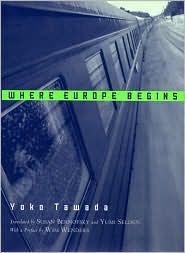
As the acclaimed director Wim Wenders points out at the forward, this book could have only been written by a Japanese. And a great book it is.
Where Europe Begins is a collection of short stories that someone, anyone really, could call postmodern. Dream and reality, fantasy and life, legend and history seem to be bounded together in harmony in these narrations. The author seems to be playing games with us and her heroes, winking an eye every now and then and saying: Nothing really is what it seems.
The collection opens with The Bath, a story where the main characters change roles or maybe costumes all the time; as if they are only faces distorted by the mirrors of reality or, in a strange way, just like puppeteers.
The Reflection, which follows, is extremely poetic and talks about the drowning of Buddhist monk in a small lake and a young girl’s connection to him.
In Spores, the writer seems to find herself in an acrobatic exhibition, walking the tightrope of words, meanings, dreams and reality, while in the Canned Foreign we start on a journey to language and its wealth, with the precious help of Sasha and Sonia.
Gilda, a woman full of fears and insecurities, is the main character in The Talisman. She does nothing but collect talismans, which will supposedly protect her from the alien that hides inside her own body, or in the computer, or even in her soup.
Raisin Eyes is a story that sounds funny but it’s not. It’s the story of a girl, whose father became a woman after eating some fresh bread.
Storytellers Without Souls is more like an essay about language, hearing and narration, than a short story. Written in a kind of light way it’s a pleasure to read.
The title of the next story tells it all: Tongue Dance. Through this weird story the writer allows us to take a look into a world of total paranoia, where we meet a girl that dreams that she’s been transformed into a giant tongue.
One of the very best (if not the best) stories in this collection is the one that gives it its title. A young woman starts off from Japan for a long sea and land journey towards Europe; or rather towards Where Europe Begins. The narrator starts writing her travelling journals even before the trip begins, in order to know what to say next. The narration here seems fractured, constructed by bits and pieces that hold it together lightly, moving forth and back all the time, mixing myth with reality. During the long journey we come to learn a few things about the Sleeping Land (Siberia), its people and their traditions.
We come to the end with A Guest, which tells the story of a woman that visits the doctor because of a severe pain in the air, only to find out that she’s pregnant. As if that’s not enough she then goes on to buy a book, which turns out to be tapes. In these tapes someone is reading the book so that’s not too bad after all. Or is it? As it seems it actually is, since sooner than later the sound of that voice will start driving her crazy. She’ll hear it all the time, whether she plays the tapes or not, day and night. Left with no other option and in her struggle to survive she’s trying to do the only thing she can do; abolish the alphabet. In this story every boundary seems to be coming tumbling down and one can no longer tell what is real and what is not.
Where Europe Begins is one of the best short-story collections I’ve read lately and Yoko Tawada is in her own special way a superb storyteller. Highly recommended.

No comments:
Post a Comment